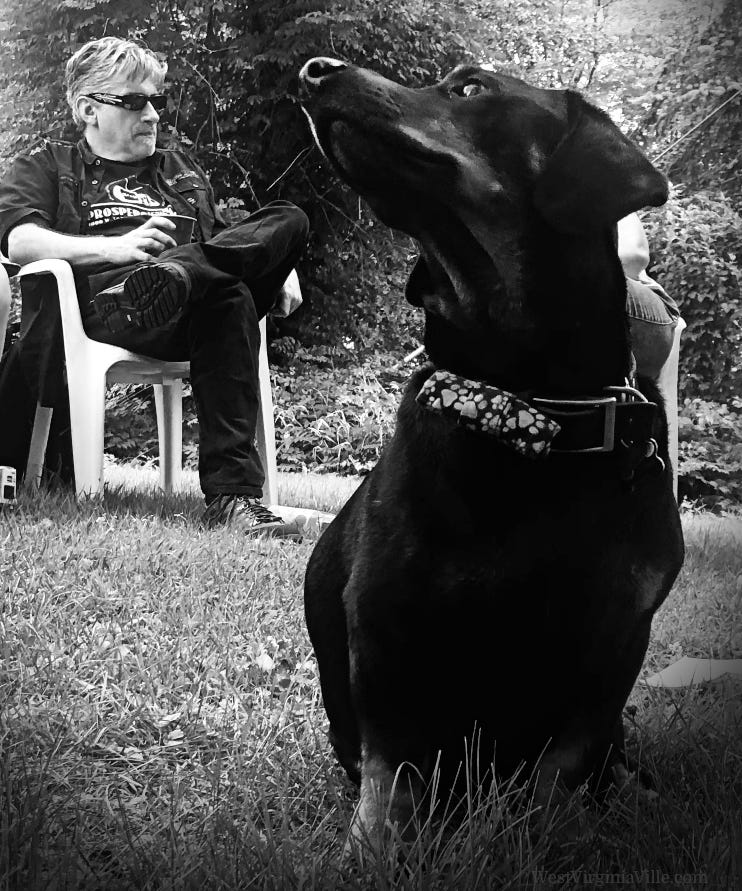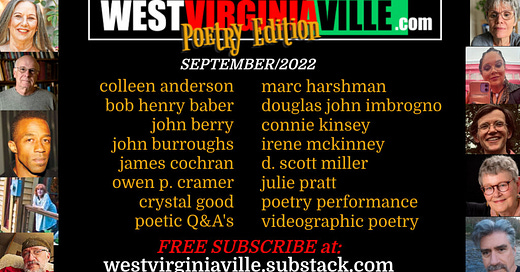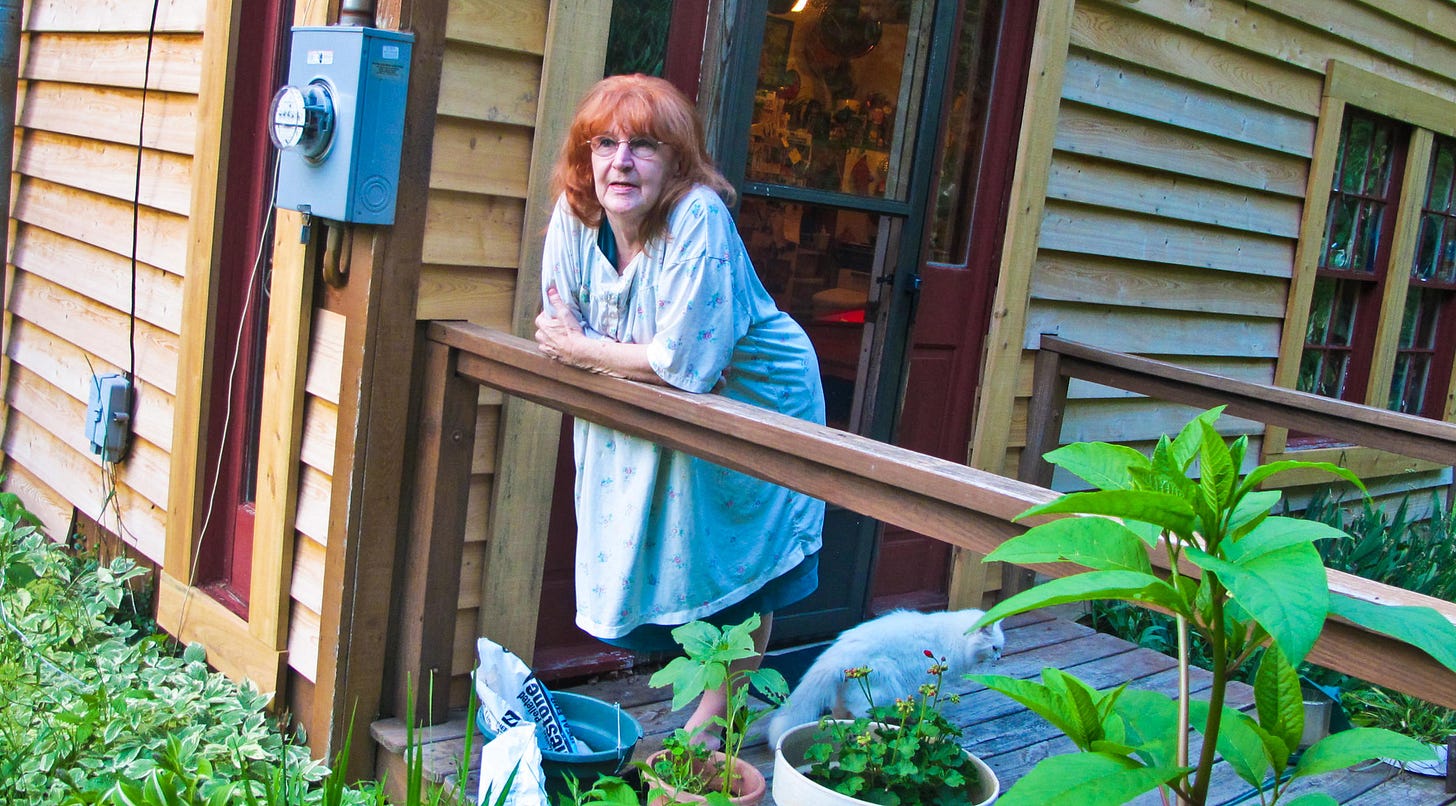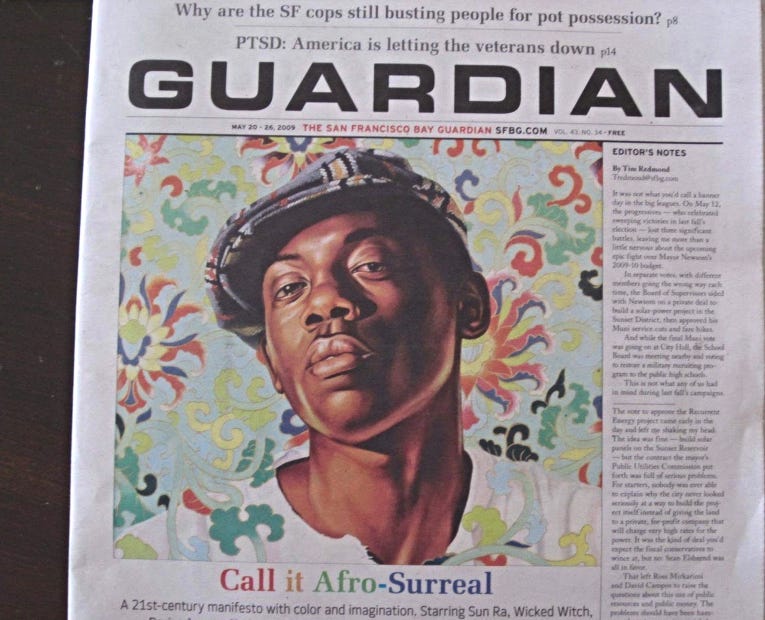The Poem Is The Thing
What’s up with an all-poetry edition, man? Isn’t that weird? | september1.2022
The poet Ezra Pound once observed: "Great literature is simply language charged with meaning to the utmost possible degree." That is about as succinct a description as you can find of what an encounter with a superb poem feels like. When I conceived of devoting an entire issue of WestVirginiaVille to poets or poems with some connection to West Virginia I didn't realize that when all was writ and done it would end up being quite so ambitious.
And ... um, large.
But when you buy pixels by the barrel the sky's the limit. Yet, once I started inviting some poets to send me a poem (plus a few writers who might not self-identify as poets but whose work I admired) things snowballed.
Then, I got invited to a poetry fest in the West Virginia outback this Summer. The event featured all-poetry-readings for two days, way out in the green hills of earth. (On the last few miles of twisty gravel road, the sole thought in my head was: 'This can't be right ...' Which is going to be the title to a song, poem or travel guide to West Virginia's backcountry someday.)

I met and heard John Burroughs read, who was recently named National Beat Poet Laureate of these United States. Yes, that is a thing, as the wake kicked up by the Beats way back when crests onward. John turned out to be a delightful poet and fine human. And — it's a small world, after all — a native of Richwood, W.Va..
That called for poems from him for this edition. Also, a Q&A: "5 QUESTIONS: With a U.S. Beat Poet Laureate & WV native." John's answers trace the life arc of a sickly, un-athletic boy, bullied while growing up in the Appalachian hills, whose encounter with poetry, he says, "ended up saving my life." And this West Virginia lad now has a full-time poetry writing-and-touring career. (Is that even legal?!)
I once said I don’t want to be
anyone but me, man, really
but then I tend to forget
I’m you and he and she
and the world is a poem
and whether or not we write
a word we’re all part of it
and each other
(from "John Cage Engaged and Uncaged" by John Burroughs)On Baber Mountain, I was also blown away by "Appalachian Freshwater Pearls," by Owen P. Cramer. Owen is a man who quickly notes he is "not a poet or Appalachian.” (He adds that he IS married to a quite celebrated poet, Pauletta Hansel, who also read and whose work I recommend to you.)
I should note about WestVirginiaVille's modus operandi: I choose people to profile and publish which "have some connection to West Virginia." A person need not be a West Virginian to have work featured, if that work reflects something about the state. Or was staged/birthed/inspired by or concerns something essential in these hills.
Which is to say "Appalachian Freshwater Pearls" is one of the most dead-on channelings I've ever read of the oligarchic, loot-the-premises-and-head-to-the-bank mentality. There is not a note out of place in this ventriloquist's incisive, mordant depiction of the unfeeling world view of men say, for instance, like Donald Blankenship and his oily ilk:
The next day, Bob Henry Baber read "Teena's Story (for Don West),” inspired by an encounter with a real-life woman whose father was, first, damaged for life while coal mining. And then — quite literally — killed by coal.
These two poems rang in my head like a conversation or maybe a debate. I felt I had to put them into the same publication, since they are opposite ends of a spectrum, joined by blood, sweat, tears, life, and death, loss, wealth, poverty, and domination.
The good stuff. And the bad, of course.
And, so, that is how I hope this wide-ranging edition functions for anyone who spends some time with it. (Especially if that Orange Wannabe Tyrant finally goes down for the count — and you require a soul-nourishing break from the torrent of news and social media craziness to follow.)
There are all kinds of conversations, reverberations, and an enlivening repartee going on as this issue canvasses a range of poems and performed poetry. "Teena's Story" and "Appalachian Freshwater Pearls" are, for example, in conversation with Crystal Good's epic "BOOM BOOM.”
In this case, you can experience two takes — one of which I had a hand in crafting — of Crystal performing this essential poem, which belongs in any canon of contemporary West Virginia poetry. I'll leave you to experience the piece — which conjoins strip-mining with as stripper’s life in Crystal’s own words, both literally and actually.
Irene McKinney at the Barbour County WV homeplace hat fed so much of her work.
All three of the above pieces, as well as every other work in this issue, are in deep conversation with the dazzling, luminous poetry of Irene McKinney (1939-2002), the W.Va. Poet Laureate from 1994 until her death.
Allow me to make a pitch to you. Read Kate Long's extended piece on this remarkable artist through to its finish: "'A farm woman wrapped up with a world-class poet." The article and its nine poems will be of special interest to writers and wannabe writers. But any human — if you’re interested in becoming more wakeful, heartfelt, and grounded in the natural world and your natural self — will come away renewed from spending 10 minutes with this most remarkable person.
As I read the profile, I kept noting down brilliant, bulls-eye things Irene McKinney kept uttering. As in:
“That facade that we present to the world is necessary, as a kind of social lubrication. Yet I think it’s very, very dangerous if we forget what the self is, the sort of bare, naked self beneath that facade.”
Her to-die-for poetry is a bugle call to the wisdom of lodging in a place that speaks to you and learning how to speak out of that place:
"So many poems I was reading were about city life or didn’t seem to take into account the rural world in any way. Or if it did take into account the natural world, it was just kind of like a decoration. It was something in the background. But to me, the natural world was in the foreground."
Speaking of growing more wakeful, her words sum up life at its best when enfolded in the West Virginia hills, the natural world ever "in the foreground."
PS: AND ATTENTION, YOU PARACHUTE NATIONAL MEDIA, ADLED BY CARICATURE ASSASSINATION: "All we are saying is give West Virginia a chance ..."
Two other extended Q&A's in this issue (we bought a LOT of pixels this month) feature two two exceptional writers, thinkers, and doers.
I was delighted to receive in the mail one of poet John Berry’s objet d'art handmade chapbooks, "The Broken Poem and Other Strange Ideas About God." We feature "The Broken Poem,” part of a gloriously fun, inquisitive poetry series on how God, who was a little bored, created the universe, with a little help from his BFFs Gravity, Darkness, and Silence.
Below is an excerpt, but you'll learn lots more from my Q&A with John: "5 QUESTIONS: Creating the universe with God, Gravity, Darkness & friends":
The words whirled in God’s hands.
‘COME ON, BABY!
MOMMA NEEDS A NEW
PAIR OF SHOES!’
God was not unused to games of chance.
‘SEVEN COME ELEVEN
ALL GOD’S CHILDREN
GO TO HEAVEN!’
God boomed, inadvertently inventing
Thunder as Silence and Darkness and
Gravity made uneasy faces.Meanwhile, a hotshot, youthful freelance colleague of mine from back in the days when Triceratops roamed in West Virginia newsrooms — D. Scott Miller — crossed my social media radar screen this year. We reconnected after too many decades beyond those days when he was, no doubt, 'shocking the bourgeoise' — this was the early 1990s in West Virginia, after all — while writing about Hip-Hop in the pages of the state's leading newspaper.
On May 20, 2009, The San Francisco Bay Guardian devoted an issue to D. Scot Miller’s “Afrosurreal Manifesto,” helping to define a movement.
Check out the arc of his career and his poetry in a double-barreled introduction — "A Poetry Sampler" and "5 QUESTIONS: From West Virginia to the San Francisco Bay and beyond." Here is a West Virginia native whose work and thought is worth knowing more about, and which has kept its edge since he was a college student in the state, hungry for a more inclusive education:
"I was considered transgressive at the time, as well, particularly in the position that Hip-Hop music was more than a fad, but a growing culture infused with poetry that had the potential to change the world."
This issue also includes the sublime poem "Not All That Much" by current W.Va. Poet Laureate Marc Harshman, who assumed that position the year Irene McKinney died.
We also feature three different, yet complementary poetic meditations on lost youth, aging, friendship, and the inexorable, sweetly painful passing of time: "The Garden You Called Eden" by Julie Pratt; "Bound Stone" by Colleen Anderson; and "The Revolt" by Connie Kinsey. James Cochran adds a poetic Appalachian travelogue, "Watoga 2021," whose ending image of a white pony hurtling through space with equanimity is my current role model for daily life.
I've tossed in my own poem, "Fiery Thoughts," which confronts some of the complexities of being a non-simple human being. And, in the interest of advancing the cause of multimedia poetry, check out "VIDEOGRAPHIC POEMS: 3 to Go," part of a series of video poems. I’ve been experimenting with the form (and am seeking fellow travelers).
Finally, a shout out to you high school-age poets and wannabe poets. James Cochran, with a little help from the University of Charleston and other area institutions, has whipped into shape a high-profile youth poetry program: "Kickstarting a Youth Poet Laureate Program in West Virginia's capital city."
And thus, two words, in closing.
Write on.
P.S.
If you enjoy WestVirginiaVille, please support this web magazine with a donation and also free subscribe at: westvirginiaville.substack.com. This issue took a huge chunk out of my month to craft, assemble, edit, and promote. And we have no visible means of support except for your generosity. Vote with your donations, so I can stand up at some future live WestVirginiaVille-sponsored event and cry: "You like us. You really like us!"









